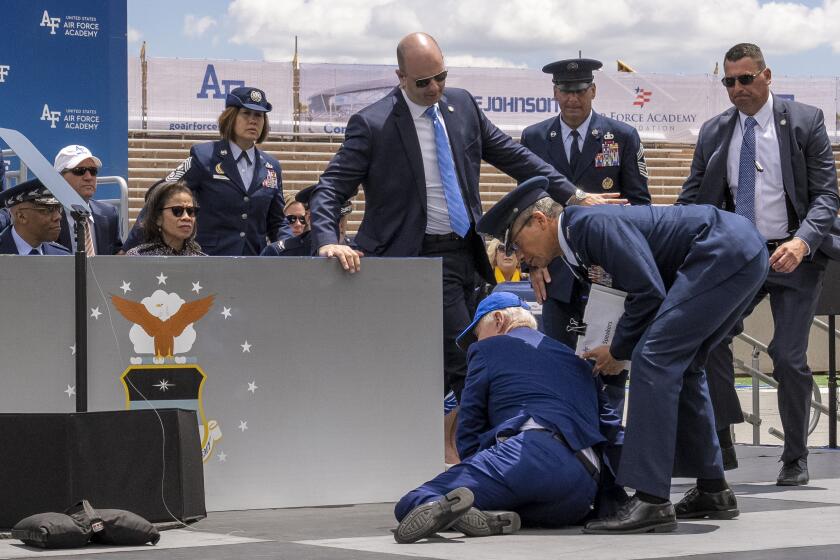A store that’s more than books
- Share via
There were more television camera crews than customers when Eso Won Books opened Sunday morning. By afternoon, though, the place was packed with customers -- many sent from church by their pastors -- as news spread that the venerable black-owned bookstore will close soon if it doesn’t sell more books.
The challenge facing the Leimert Park shop is neither new nor distinctly black. Independent bookstores have been on the endangered species list for years.
Twenty years ago, the threat was from chains, like Crown, then mega-stores like Borders. Now the competition is online; one-third of all books sold in this country today are ordered through the convenient clicks of Amazon.com.
But in an era when neighborhood businesses -- from hardware stores to pharmacies -- are often pushed into insolvency by corporate giants, why does the closure of a bookstore spark such hand-wringing?
Because bookstores sell more than books; they offer a sense of community. At their best, this vanishing breed -- think Midnight Special in Santa Monica, Dutton’s in North Hollywood, Sisterhood in Westwood -- functioned not just as shopping venues, but libraries, sanctuaries and public plazas.
When I moved here from Ohio at 25, I spent months feeling lonely and lost. I found a family at Bread and Roses, a women’s bookstore in Sherman Oaks. The store became my favorite hangout, with cozy sofas, an endless supply of cookies and coffee, and shelves stocked with everything from pregnancy primers to dress-for-success manuals to politics-of-lesbianism manifestoes.
But it was less the books than the people that drew me in. When I couldn’t get my baby to sleep through the night or wondered how to ask my boss for a raise, I relied not only on advice I read, but lessons I learned from the women I met there.
For hours, we’d thumb through books and talk, sharing stories too intimate for the strangers we’d been. Some I’d never see again. Several became my closest friends.
Bread and Roses closed and I moved on, taking my business to a discount chain a few miles from home. I’m sure I saved money over the years. But I never made a friend at Crown.
The concept -- a bookstore for women -- seems almost quaint today. Maybe the era of the niche bookstore is over, done in by assimilation , technology and upward mobility. The type of “community” I found at Bread and Roses, can be found online, not in chain bookstore aisles. All we need from Borders is a wi-fi connection and a table where we can sit. Alone.
Or you can visit a place like Eso Won, where co-owner James Fugate gently steered a church-going grandma away from a birthday selection for her teenage granddaughter because the story’s heroine gets pregnant at 14. He knows the book has “bad language in it that she wouldn’t want her child to read.”
I visited the store this weekend with my teenage daughter, who came of age in Borders and Barnes & Noble, ordering lattes and reading “Gossip Girl.” She found a volume of poetry she liked and a dense book on images of race in film.
I bought three books: a “chick lit” paperback by a favorite author, a book of short stories with a cover blurb by poet Nikki Giovanni, and “How to Love a Black Man,” a book I would be too embarrassed to buy -- lest anyone think I need it -- if they even had it at my local Borders.
And I found other customers like me, who had come to this store in the heart of black Los Angeles from Pasadena, Castaic and Long Beach, not just to find books they might enjoy, but to feel, for a little while, not in the minority.
Like Veve Price, from Woodland Hills, sporting an Afro that made her tower over me. She shops online but finds it unsatisfying sometimes. “There’s something about being able to touch the books, feel them in your hands,” she said. And there’s the delight of discovery -- of stumbling over some precious find you didn’t know you wanted until you saw it.
For her, it was a pictorial history of the Black Panther Party. As we stood in line to be rung up, she opened the book to share it with me.
From a purely business sense, it’s not hard to see why Eso Won is struggling. What to make of a store that features an appearance by the author of “Butt Naked Raw & Uncensored,” and four days later, a professor speaking on “Global Organized Crime and the African World Community.”
The shelves are a jumble of topics, perspectives and genres: A novel by actor Blair Underwood about a “gorgeous sexy actor and former gigolo” sits next to “Slavery, Resistance and Freedom,” a collection of historical essays. On the clearance rack, I found “Rebellion in Chiapas, an Historical Reader,” and a thick tome featuring 600 Hong Kong movie reviews.
Fugate said Monday that sales “were up 500% over a typical weekend. . . It was almost like Christmas Eve.”
But he and his business partner Thomas Hamilton have struggled enough in their 20 years to put the weekend love fest in perspective.
And they got a sobering reminder of the battle ahead from another weary veteran, Ed Conklin, manager of Dutton’s in Brentwood, which is still struggling to beat back corporate threats. Conklin visited the store on Friday.
Enjoy it, he told them. But don’t expect it to last.
--
More to Read
Sign up for our Book Club newsletter
Get the latest news, events and more from the Los Angeles Times Book Club, and help us get L.A. reading and talking.
You may occasionally receive promotional content from the Los Angeles Times.










